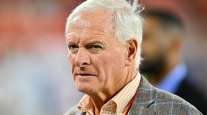Senior Reporter
Pilot Informant Seeks Whistleblower Status From Supreme Court in Rebate Fraud Scam

This story appears in the Feb. 20 print edition of Transport Topics.
A stockbroker turned FBI informant who tipped off investigators to the Pilot Flying J fraudulent diesel rebate scheme has asked the U.S. Supreme Court to grant him whistleblower status.
John Verble, a former Knoxville, Tennessee-based financial adviser with Morgan Stanley Inc., said in a petition for writ of certiorari he was “Confidential Human Source No. 1” cited in a 120-page FBI affidavit used to obtain a search warrant for a raid on Pilot’s headquarters in April 2013.
 Verble/TT File Photo
Verble/TT File PhotoSince the raid, 10 Pilot executives have pleaded guilty for their part in the multimillion-dollar fraud, another eight executives have been indicted and are set for trial in October and the company has paid $92 million in civil penalties to the federal government.
The petition claims that Verble secretly recorded discussions with Pilot sales executives and also provided information to the FBI on possible insider trading by one of Morgan Stanley’s clients.
The FBI affidavit said the investigation began in May 2011 when “CHS-1” contacted the agency and reported that a Pilot sales executive told him of the fraudulent activities by some of the truck stop chain’s employees.
The two worked with the FBI for about a year, secretly recording sales meetings, during which company executives discussed cheating truckers out of agreed upon diesel fuel rebates, according to the affidavit.
Verble’s attorneys filed the petition with the high court late last month in relation to a 2015 federal lawsuit against Morgan Stanley, which Verble claims fired him after discovering that he was secretly working with federal investigators.
Morgan Stanley attorneys did not respond to a request for comment. However, in court documents, the company has denied firing Verble for working with the FBI, saying he was instead terminated for secretly arranging a kickback deal with a sports agent representing a National Football League player.
Verble has been denied whistleblower status by a federal district judge and the 6th U.S. Circuit Court of Appeals. If his request is granted by the Supreme Court, he would be eligible for financial compensation for “physical and emotional distress” and prohibition against retaliation as a result of his work with the FBI.
The petition said that because of Verble’s proximity to other Morgan Stanley brokers, executives with Pilot Flying J and executives with Miller Energy [Resources Inc.], he observed “substantial illegal and unethical conduct that offended his sense of right and wrong.”
“Instead of hunkering down and minding his own business, Mr. Verble approached the FBI with this information and then acquiesced in serving as a confidential informant, which, among other things, [included] wearing a wire and recording incriminating conversations,” the petition said.
In a 2015 letter to Verble’s attorney, the FBI confirmed that Verble provided information about possible insider training and passed it along to the U.S. Securities and Exchange Commission.
In August 2015, the SEC filed civil charges against Miller Energy’s chief financial officer, operating officer and audit team leader for overstating the value of the company’s oil and gas properties by more than $400 million. Miller subsequently settled with the SEC, has filed for bankruptcy and become the subject of a federal criminal probe.
In declining to grant Verble whistleblower status, the courts so far have said he has not provided sufficient information of his informant activities.
But in his petition, Verble said that both the FBI and Justice Department are “notoriously reluctant” to testify in civil cases or to assist litigants who have been helpful to law enforcement.
“Therefore, assembling concrete proof relating to FBI investigations at the pleading stage is difficult in cases involving either the FBI or Department of Justice,” the petition said.




